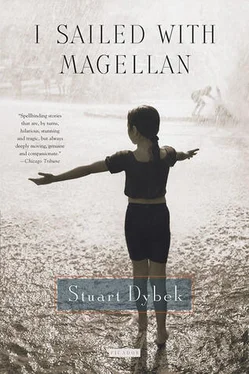Stuart Dybek - I Sailed with Magellan
Здесь есть возможность читать онлайн «Stuart Dybek - I Sailed with Magellan» весь текст электронной книги совершенно бесплатно (целиком полную версию без сокращений). В некоторых случаях можно слушать аудио, скачать через торрент в формате fb2 и присутствует краткое содержание. Год выпуска: 2004, Издательство: Farrar, Straus and Giroux, Жанр: Современная проза, на английском языке. Описание произведения, (предисловие) а так же отзывы посетителей доступны на портале библиотеки ЛибКат.
- Название:I Sailed with Magellan
- Автор:
- Издательство:Farrar, Straus and Giroux
- Жанр:
- Год:2004
- ISBN:нет данных
- Рейтинг книги:4 / 5. Голосов: 1
-
Избранное:Добавить в избранное
- Отзывы:
-
Ваша оценка:
- 80
- 1
- 2
- 3
- 4
- 5
I Sailed with Magellan: краткое содержание, описание и аннотация
Предлагаем к чтению аннотацию, описание, краткое содержание или предисловие (зависит от того, что написал сам автор книги «I Sailed with Magellan»). Если вы не нашли необходимую информацию о книге — напишите в комментариях, мы постараемся отыскать её.
story writer Stuart Dybek returns with eleven masterful and masterfully linked stories about Chicago's fabled and harrowing South Side. United, they comprise the story of Perry Katzek and his widening, endearing clan. Through these streets walk butchers, hitmen, mothers and factory workers, boys turned men and men turned to urban myth.
solidifies Dybek's standing as one of our finest chroniclers of urban America.
I Sailed with Magellan — читать онлайн бесплатно полную книгу (весь текст) целиком
Ниже представлен текст книги, разбитый по страницам. Система сохранения места последней прочитанной страницы, позволяет с удобством читать онлайн бесплатно книгу «I Sailed with Magellan», без необходимости каждый раз заново искать на чём Вы остановились. Поставьте закладку, и сможете в любой момент перейти на страницу, на которой закончили чтение.
Интервал:
Закладка:
Mrs. Candido drove slowly along Cermak, part of the parade. It was hot and sunny, but the top was up on the Buick as it always was, no matter how bright the day. It made me wonder why she wanted a convertible.
Sid Sovereign, wearing a kid-size maroon cape that looked on him like an askew napkin, led us with the kind of baton that twirlers throw. A cigarette bobbed from the corner of his lip, and his gait wouldn’t have passed the walk-a-straight-line test at a DUI stop. He was definitely marching under the influence and probably couldn’t have managed to be out here sober. He signaled for us to turn down California Avenue. Mrs. Candido got caught at a red light, and Sovereign held us up, marching in place until the Buick turned down California, too. He had told us that we were only going to march once around the block, but we’d already gone farther than that and were on our fourth chorus of “When the Saints.” As soon as her white convertible caught up with us again, we marched the few blocks to the elevated station for the Douglas Park “B.” In the blaze of sunlight, the shadows of the El tracks and girders latticed the pavement. It felt cooler stepping into them, and our playing was graced with the resonance that shadow imparts to sound. I could see the people waiting on the platform for the “B” grinning down at us. A two-car El train clattered over, the screech of its braking steel wheels about as in tune as we were. Sid Sovereign signaled with the baton for us to stop playing but to continue marching in place.
I figured the El was the point he’d been heading for and now we’d turn back to the Boys’ Club. The El station was the kind of boundary that doesn’t show up on street maps. East of the tracks was Little Village, with its Ambros and Two-Twos and Disciples graffiti; west was a narrow stretch of No-Man’s-Land and then the African American neighborhood of Douglas Park, embossed with the graffiti of the Insane Unknowns.
The “B” train overhead clapped its doors shut and rattled off downtown to its own rhythm.
“Oh, yeah!” Sovereign hollered, waving the baton as if directing the train’s departure. The baton had become his scepter, and he saluted Mrs. Candido, who had all the windows open and waved back. She was wearing sunglasses and a picture hat that looked too big for the interior of the Buick — one more reason to drop the top. Sovereign regally sceptered at the commuters descending from the station. They looked surprised to see a band awaiting their arrival.
“Oh, yeah!” Sovereign yelled to no one in particular. “I feel we could march all the way to Riverview!”
I pictured the Blue Streak, Shoot the Chutes, Aladdin’s Palace, and the Rotor, a ride whose centrifugal force pinned you to a wall, defying gravity when the floor dropped out.
“I think he’s on speedballs,” Miguel Porter said.
“Okay, my little hepcats, my little mariachis,” Sovereign yelled. “Okay, now let me hear it! A one, two, and glockenspiels, yeah!”
The glocks started pinging “One o‘clock, two o’clock, three o’clock.” We all shouted “Rock!” and Sovereign gave a little hop and landed yelling “ka-POW!” This was the one part of the song I could keep up with, and I was into it, too. The bystanders from the El train cheered. Sid Sovereign yelled, “Oh yeah, baby, tubas! Tubas give it to me, baby, oh yeah, let me have it!” We gave it to him: an oompahed “four o’clock, five o’clock, six.” Sovereign pointed the baton straight ahead, and to the roar of “Rock!” and of a “B” train screeching in, we marched under the tracks and out the other side into No-Man’s-Land.
The pavement thumped beneath our synchronized, rock-steady, maroon columns, and for the first time I managed to keep my place in the music and dared to play louder, suddenly recalling a dream in which Uncle Lefty’s clarinet could play itself. Playing felt automatic, as if the band glided on a conveyor belt of the music we blew before us. People, more and more of them black, stepped from doorways and threw their upper-story windows open to gape. Pumping the baton like a drum major, Sid Sovereign led us through stop signs without stopping as if we had the immunity of a funeral. When the green of Douglas Park appeared, Mrs. Candido began honking her horn, and Sid Sovereign, pretending to toot the baton as if it were a clarinet, and yelling, “Oh yeah, baby, pow, pow, pow! bass drum!” bowed in her direction. He must have thought she was musically tooting her automobile horn, adding a touch of Spike Jones, though what she actually signaled was, Where the hell are you taking my little Julio?
Sovereign hadn’t noticed that our parade had grown longer. We’d attracted a group of black kids who’d been hitting a softball in the park. Other kids from Douglas Park had joined them. They were marching in the gutter beside our column, and still more were running in our direction. Maybe Sovereign thought that music afforded us some dispensation and that everyone simply wanted to join in the fun as if we were Alexander’s Ragtime Band.
It almost looked that way at first. The new paraders from Douglas Park seemed to be enjoying themselves — laughing at our uniforms, marching backward, colliding into our ranks, and yelling, “Pow! Pow! Pow! motherfucker.” A lanky guy in a shower cap codirected us with a softball bat, mimicking Sovereign’s baton technique. We marched with our eyes fixed straight ahead, as if oblivious to the growing chaos at our flanks and the shouts of “You disturbing the peace!” But it was impossible to ignore the guy in the shower cap suddenly whacking the bass drum with the bat, radically changing the beat. We were heading along a sidewalk across the street from the park when out of an upper-story window someone emptied a pot of water into the tubas. A bottle crashed down. Voices yelled, “Hey! Shut that honky shit up down there!” The bass drum player was in a tug-of-war with a kid who wanted the trophy of a fuzzy mallet, while the shower-capped guy with the bat kept banging the drum.
We were double-timing, triple-timing, nearly jogging and still playing — I was back to droning middle C — and a confetti of garbage fell from windows and roofs. Sovereign was hit in the head — for an instant it appeared his skull had exploded, but it was just a tomato. He staggered and, looking stunned, directed us to turn down a side street. Mrs. Candido, blaring her horn nonstop, screamed, “Julio! Julio!” Julio broke ranks and ran for the car as a half-eaten pizza Frisbeed down, splatting the convertible top and windshield. It looked comical to see Mrs. Candido’s wipers working as she gunned away. I wished I was in the Buick with Julio — they wouldn’t hear a peep from me about the top being up — and when the car disappeared I felt abandoned.
A band member’s trombone was now in the possession of a guy whose biceps were not tattooed but branded with gang insignia, and who was busy working the slide to produce brassy lipfarts. A kid about my age, smiling cheerfully beneath the brim of a White Sox hat nesting on an Afro, grabbed for my clarinet. I wrenched it away, filled with sudden panic over having to tell Uncle Lefty, if he ever returned from California, that I’d lost his horn. The band broke into a disorganized jog, and then we were running, abandoning horns and glockenspiels, the drummers trapped in their harnesses, every man for himself in full retreat. I cut from the pack, down another side street and another.
The itchy cape flared behind me, tugging at my throat, perfect for someone to grab and pull me down. Voices shouted, but I didn’t turn to see who was chasing. My ill-fitting hat flew off, then my sheet music, and next the clip-on music stand, but I kept a grip on the clarinet. I was fast, the fastest kid in my school. I might be tenth clarinet, but I was first in every footrace, and the spats buttoned above my PF flyers seemed to make me faster still, as if I’d added winged heels. I thought I was fleeing in the direction of No-Man’s-Land but wasn’t sure. The streets were a blur and I had a stitch in my side, but I kept running. On an impulse I turned down a side street I hoped would lead back onto California. My gym shoes splashed through water, not puddles but a current that swirled the rubbish out of the gutters. The street was flooded: every hydrant opened, boards jammed in their geysering mouths, fanning pressurized water into the prismatic mist of phantom rainbows. I was in a strange neighborhood that expressed its anarchy in water, a village on the shore of pouring hydrants. Its inhabitants wore wet clothes plastered to their bodies and cavorted through the torrents. A young Spanish girl in shorts stood beside the fountain of a red fire pump, her arms spread as if she were balancing on ripples. She was humming aloud to herself — a tune without a language, maybe her secret fire-pump song.
Читать дальшеИнтервал:
Закладка:
Похожие книги на «I Sailed with Magellan»
Представляем Вашему вниманию похожие книги на «I Sailed with Magellan» списком для выбора. Мы отобрали схожую по названию и смыслу литературу в надежде предоставить читателям больше вариантов отыскать новые, интересные, ещё непрочитанные произведения.
Обсуждение, отзывы о книге «I Sailed with Magellan» и просто собственные мнения читателей. Оставьте ваши комментарии, напишите, что Вы думаете о произведении, его смысле или главных героях. Укажите что конкретно понравилось, а что нет, и почему Вы так считаете.












